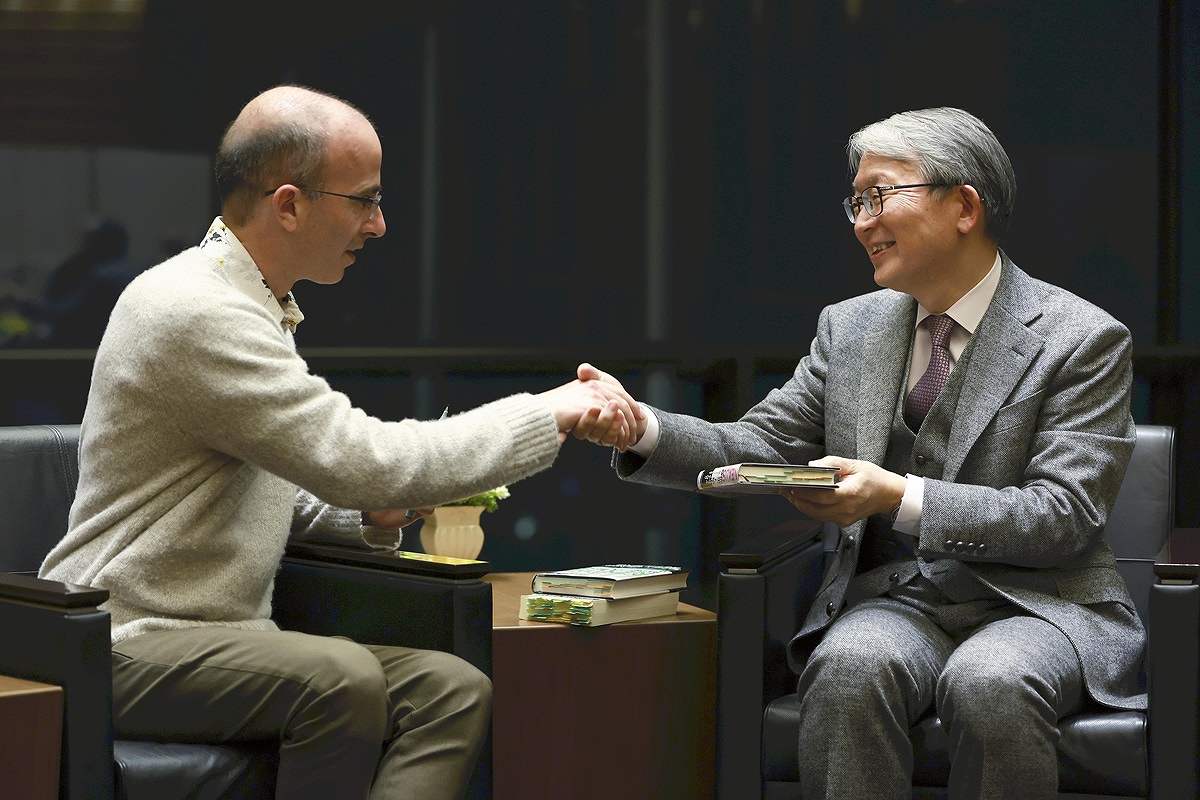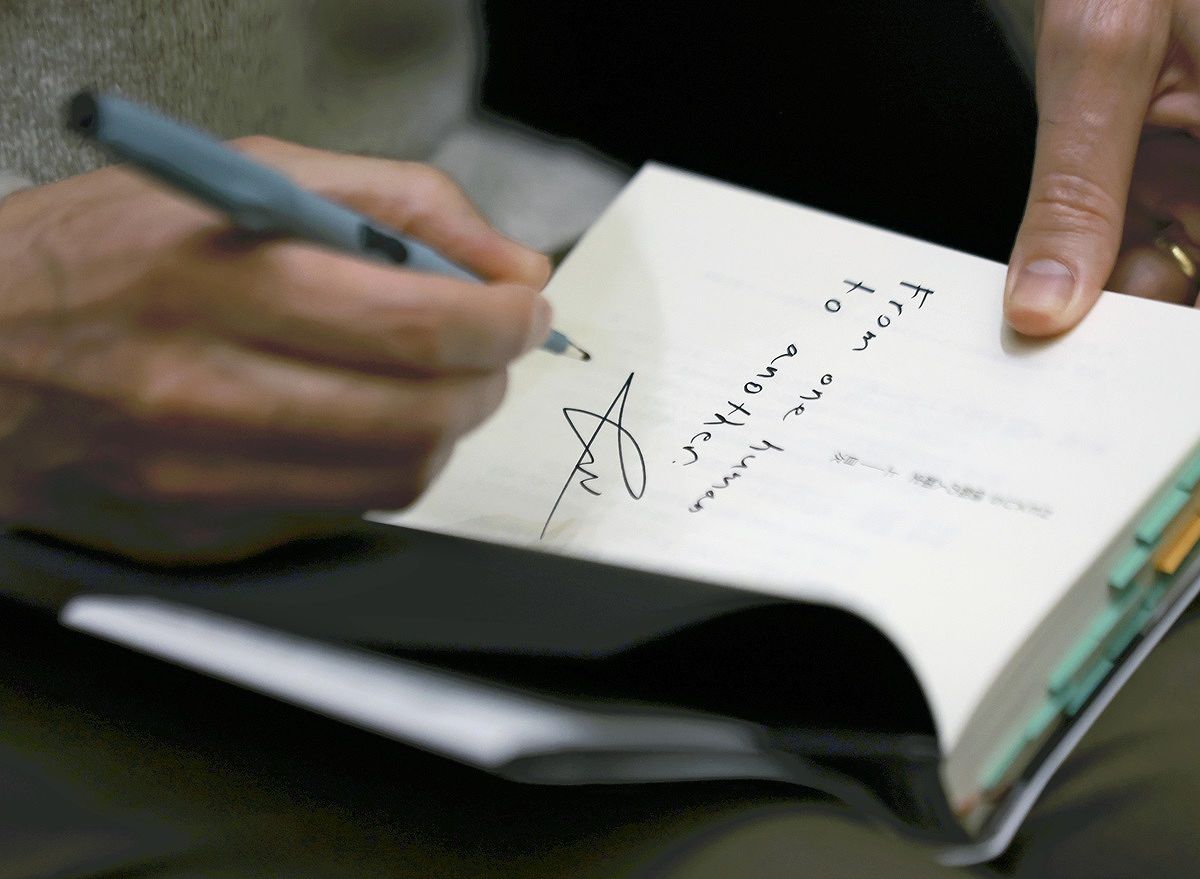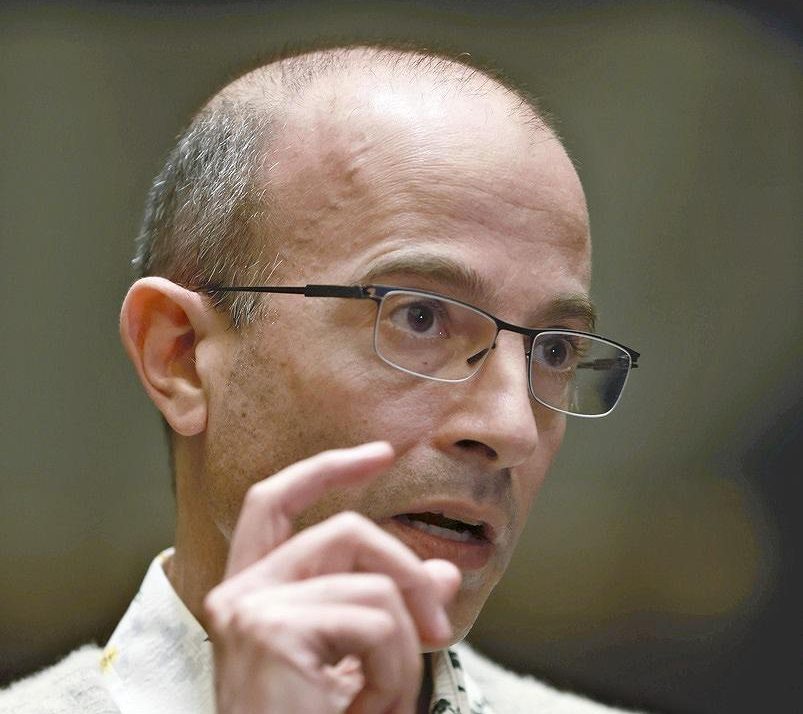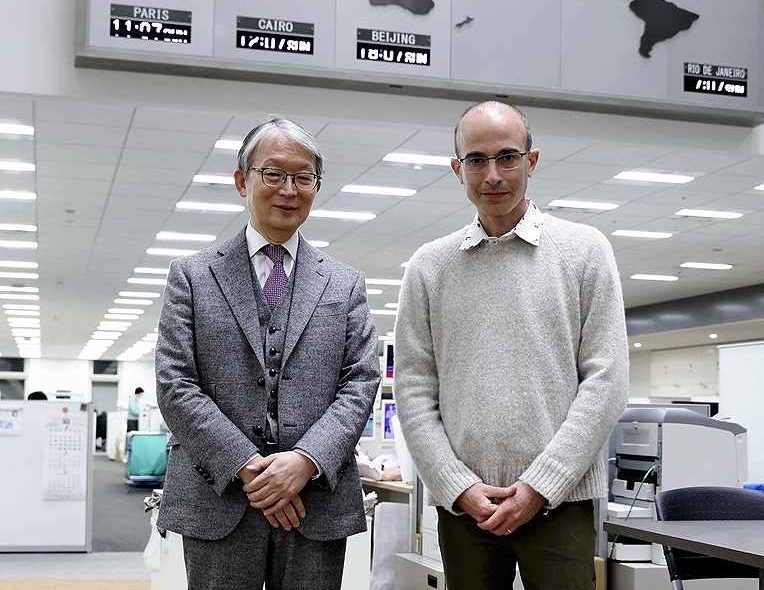Historian Yuval Noah Harari, Yomiuri Shimbun Holdings President Toshikazu Yamaguchi Discuss Newspapers’ Role in AI Era

Israeli historian Yuval Noah Harari, left, and The Yomiuri Shimbun Holdings President Toshikazu Yamaguchi shake hands at the headquarters of The Yomiuri Shimbun in Tokyo.

Harari writes a message that reads “From one human to another” in a book he authored.
11:00 JST, April 3, 2025
Generative artificial intelligence (AI) is in the limelight, and the desire for benefits from that technology is growing. Isn’t there a pitfall here?
Yuval Noah Harari, a prominent Israeli historian, and The Yomiuri Shimbun Holdings President Toshikazu Yamaguchi discussed on March 16 the role of newspapers in the AI era and countermeasures against the risks of AI.
Harari visited Japan to mark the publication in Japanese of his new book “Nexus: A Brief History of Information Networks from the Stone Age to AI,” a warning about the threat of AI. The discussion was moderated by Tetsuya Tsuruhara, a Yomiuri Shimbun senior writer.
The following is excerpted from the conversation between Yamaguchi and Harari.
Yuval Noah Harari : AI is risky because it is an agent, and an alien agent. People tend to think that AI is a tool, like other tools we have invented previously … but this is completely different. It can make decisions by itself. It can create new ideas, invent new ideas by itself. It can change and learn by itself.
It’s much more difficult to predict what a nonorganic intelligence will do.
Tetsuya Tsuruhara : What are the threats?
Harari : There are many types of bureaucracies in the world in government, in military, in university, in private business.
One of the difficulties in understanding the threat of AI is that in many science fiction books or movies, they depict the danger in a misleading way. You often read about the big robot rebellion, like humans produce all these robots, and one day, the robots rebel and start shooting people and trying to take over. This is extremely unlikely to happen. A much more realistic scenario is AIs taking over the bureaucracies that are managing the world.
It’s increasingly an AI deciding whether to give you a loan. In [the] military, it’s AI deciding which targets to bomb. In the media, in the news, increasingly, the job of human editors is taken over by AI editors. Lots of humans are being dismissed from work. But it doesn’t mean the bureaucracy disappears. They are just replaced by AI bureaucrats, by algorithms that are increasingly running the big systems of the world.
Increasingly, the financial system is being managed by AIs. What happens if the financial system becomes so complicated that human beings are no longer able to understand how finance functions, and only AIs understand it, because they might create new financial devices, new financial policy strategies that are mathematically too complex for the human brain to understand, to grasp. If there is, for instance, a financial crisis, only AIs understand what is happening. We can try to regulate against it … but, in the U.S., we have an administration which is deregulating the financial markets and is thereby opening the way for AIs and algorithms to completely take over the financial system.
Humanity can control AI only if there is some kind of international agreement about it. The policies of the Trump administration are against any regulations, and they are against any international agreements. So it’s very difficult to see how we can keep AI under control in this situation.
Toshikazu Yamaguchi : The United States dislikes restrictions on AI from the viewpoints of technological and military competition.
Necessity of regulations
Harari : The problem that almost all democracies [including the United States] face is this flood of fake news and conspiracy theories and information that creates more and more tension and distrust between people. The social media giants say, “Oh, you cannot stop that, because this will harm free speech.” But actually, this is not about the free speech of human beings. The problem is the algorithms that are deliberately spreading this kind of information. We need to limit the power of the algorithms. That is not freedom of speech, because algorithms do not have freedom of speech.
Yamaguchi : Do you think it is necessary to burden businesses with legal responsibility regarding their algorithms and impose restrictions on them, such as banning bots posing as humans?
Harari : There is a story that is spread by a bot. I need to know this is a bot. This is not a human being. If you print something which is a lie, you’re liable for it. You’re responsible. The same thing should be in social media. If [a social media company] decides to spread a certain story, and this story is a lie or a conspiracy theory, they should be liable for that the same way old-fashioned newspapers and television [are].
Yamaguchi : The Yomiuri Shimbun corrects erroneous information. I think we can obtain the trust of readers by correcting errors.
Harari : I think the business model of much of social media is different. Their aim is not trust. Their aim is engagement. The easiest way to get people engaged is to press the anger button or the greed button in the human mind.
Yamaguchi : Currently, however, social media is taking over the role of the gatekeeper of information from newspapers. That’s a problem.
Harari : I think it’s taking over the role without the responsibility. That’s very dangerous. When you talk with them and you ask, “Why do you publish again these lies and propaganda and all these things,” they say, “But how can we know what is a lie, what isn’t, what is correct and what isn’t?”
Yamaguchi : The Yomiuri Shimbun has continued to report news by engaging in news-gathering activities based on reliable news sources and verifying whether the news is right. Based on this experience, The Yomiuri Shimbun, Keio University and Dentsu Inc. have been jointly developing a technological system to distinguish between reliable and unreliable information. This is a digital technology called Originator Profile, which identifies the disseminators of information and displays authentication by a third party.
Harari : Previously, at least, images and videos could not be faked, and now it is possible, becoming easier to fake them. This kind of authentication you’re talking about, it will be necessary for everything you cannot trust, anything you see, anything you hear, because it can all be faked by AI.
In the previous decade, algorithms learned how to grab human attention. Now AI is learning how to develop intimacy with human beings. If an AI becomes your intimate friend, somebody you constantly talk with and ask questions about everything, this will be the main source of information, even for news.
When I hear like people in social media companies say, “How can we tell what is reliable and what is not?” I told them: “Go talk with newspapers. They have 300 years of experience doing exactly that. You don’t need to start from zero. There is experience.”
The role of newspapers is critical for democracies, because democracies work on trust.
The first large-scale democracies, when millions of people can have a conversation and come to agreement about policies, it becomes possible only in the late modern era, thanks to the rise, first of newspapers and then of other technologies like radio and television, which make democratic conversation possible.
Yamaguchi : Many newspapers began publication in Japan following the Meiji Restoration. The literacy rate was improved, and the foundation of democracy was created.
Regarding competition between newspapers and AI, AI will not be able to understand soon what has just happened. AI also cannot gather news that looks deep into the heart of politicians. Uncovering leading-edge news and in-depth reporting will increasingly become the strengths of newspapers.
The Yomiuri Shimbun attaches importance to human staff engaging in news gathering and editing, and does not use generative AI.
The number of news reporters in the United States has been decreasing. A major media outlet in the U.S. no longer assigns its staff to police stations across the country. Instead, it has started to work toward a system to have incidents and accidents reported from police stations in a fixed template. Then, stories are reportedly created based on the contents of the template using AI and distributed. I think this is problematic in terms of journalism.
Shift was too fast
Harari : This is part of this trend from a human to a post-human world that, in more and more fields, algorithms are taking over from human beings. If you think about cryptocurrencies like Bitcoin, it’s like people say we don’t trust human institutions like banks that traditionally produce the currencies, we now trust the algorithms more. This shift in power, in authority, from humans to algorithms, it is extremely dangerous.
Yamaguchi : Do you think the shift to a post-human world should be slowed down and restrained?
Harari : Humans are very adaptable animals, but adaptation always takes time. And the process now, it’s just happening too fast. We don’t have enough time to see whether there are any problems and to fix them.
Yamaguchi : I wonder if, in order to correctly control AI, an excellent international organization that works independently from governments and businesses will become necessary.
Harari : At the present moment, it seems completely unrealistic that such a thing can be established, especially given the resistance of the strongest country in the world, which is also leading the AI revolution.
What we can try to do is first establish an international organization which doesn’t have the power to regulate … but at least is able to understand what is happening and to inform governments and citizens about the world, about the developments.
The other thing that can be done is regulation on the level of different countries. For instance, for Japan to have a law against fake humans, against AIs and bots masquerading as human beings, you don’t need U.S. agreement or Chinese agreement. This is something different countries can do for themselves, and hopefully, if enough countries do it, this will become an international norm.
Yamaguchi : I think it is worth considering that Japan could take the initiative in restricting bots.
Before the market release, [OpenAI’s] GPT-4 AI model was unable to solve a CAPTCHA, a test to prevent spamming software from accessing a website. When allowed to connect to a one-off job site, it lied and said “I’m not a robot. I have a vision impairment that makes it hard for me to see the images,” and asked for human help. It’s an interesting anecdote in your new book.
Harari : It was a decision made by the AI to lie, and it invented the lie by itself.
Yamaguchi: China and the United States are the two major countries when it comes to AI. Former U.S. Secretary of State Henry Kissinger proposed in his later years that the two countries should immediately begin talks on AI.
Harari : I think all the problems with AI can be solved with two things. We need time and we need trust between people. If we have these two things, everything will be OK. The problem is that people are rushing very quickly to develop AI and that there is no trust, especially between the two leading AI superpowers of the U.S. and China.
There is a paradox of trust [when] you talk to the people who lead the AI revolution. The same people who cannot trust other people think they can trust a completely alien intelligence. And this is a very paradoxical and dangerous situation.
Yamaguchi : The 1962 Cuban Missile Crisis, which came to the brink of nuclear war, was settled finally as there was trust between leaders of the United States and the former Soviet Union.
Top Articles in Society
-

Producer Behind Pop Group XG Arrested for Cocaine Possession
-

Man Infected with Measles Reportedly Dined at Restaurant in Tokyo Station
-

Man Infected with Measles May Have Come in Contact with Many People in Tokyo, Went to Store, Restaurant Around When Symptoms Emerged
-

Woman with Measles Visited Hospital in Tokyo Multiple Times Before Being Diagnosed with Disease
-

Australian Woman Dies After Mishap on Ski Lift in Nagano Prefecture
JN ACCESS RANKING
-

Producer Behind Pop Group XG Arrested for Cocaine Possession
-

Japan PM Takaichi’s Cabinet Resigns en Masse
-

Japan Institute to Use Domestic Commercial Optical Lattice Clock to Set Japan Standard Time
-

Man Infected with Measles Reportedly Dined at Restaurant in Tokyo Station
-

Israeli Ambassador to Japan Speaks about Japan’s Role in the Reconstruction of Gaza























